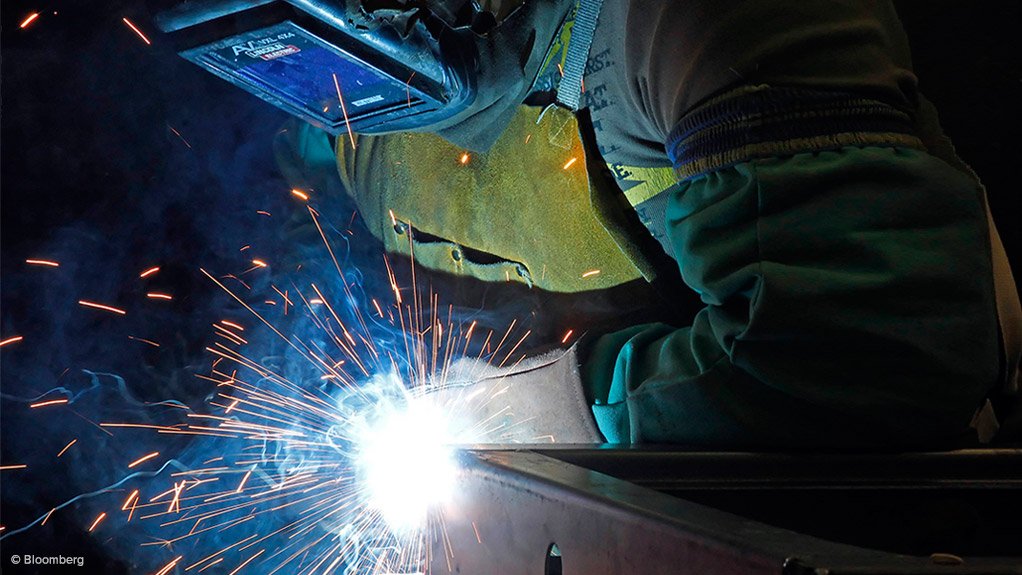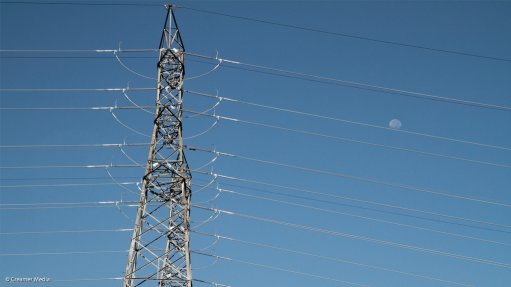SA’s welding industry remains strong beside weak manufacturing sector


PROMISING OUTOOKWith improving standards, training and new technologies and techniques, the future of welding looks bright(Source: Bloomberg)
Photo by Bloomberg
The future of welding is closely linked to the manufacturing and construction sectors; therefore, when manufacturing does well, plenty of welding work is available and vice versa.
However, despite the weak economy, global competition and the decline in manufacturing being faced, the welding industry remains stable owing to the increase in welding applications and techniques, says Southern African Institute of Welding (SAIW) executive director Jim Guild.
“There are many challenges in the macroenvironment to deal with, but welding remains an exciting industry to be in and offers several international and national career opportunities,” he says.
Recent research has empirically proved that the use of technology will positively impact on business success, and the welding industry, says Guild, has embraced new technologies and methodologies.
The level of technology used and the complicated nature thereof are always increasing, leading to a higher level of automation. New processes and methodologies, such as high-energy processes like laser welding, are constantly being developed.
Welding is also becoming more demanding, notes Guild, explaining that this requires higher standards, which are enforced nationally and internationally, driving quality assurance, testing and inspection.
It is common knowledge that there is a skills shortage in South Africa and welding is no exception. He says the fact that new teaching techniques are being developed but not all are being used is partially to blame.
The latest development in welding teaching techniques involves simulation, which helps verify welding capability and hand-eye coordination for a variety of processes.
Computer-based learning processes, or e-learning, are also starting to find application, and in the welding industry, there is a wealth of well-developed visual material, notes Guild.
“Semiautomated and automated welding equipment is increasingly being employed, which leads to a different set of skills requirements. This is because there is an increased need for welding technology operators of programmed equipment rather than manual welders,” he adds.
Among all these changes in the industry, the one under- lying factor that permeates every facet of welding is safety. At the SAIW, safety has always been an integral part of courses but more attention is paid to safety officers and safety- specific personnel.
There is also an increasing use of high-quality programmes and certification.
The SAIW notes that it has certified more than 55 companies over the last couple of years and receives new requests for certification regularly. This indicates that quality is becoming more of a focus area in the industry, says Guild.
The SAIW’s training courses are also constantly updated and research and development is ongoing.
“The new metallurgical testing labora- tory at the SAIW’s head office, in Johannes- burg, is testament to how seriously the institute and the industry are taking quality and the resultant safety in welding,” says Guild, adding that a new safety course has been launched at the institute to further enhance awareness of and knowledge about safety.
He highlights that there are two aspects of safety: the safety of the welding opera- tions and the integrity of the welded product. One will protect the operator and the other will protect the population.
To cover both of these safety aspects, there is a renewed focus on quality and building safety in the manufacturing process, rather than just inspecting the end result.
This requires, and increases the need for, qualified people in the manufacturing process. There are several training institutes fulfilling the educational needs of potential welding engineers, such as the International Institute of Welding, which offers an engineering diploma – offered by the SAIW and its approved training bodies, the University of the Witwatersrand and the University of Pretoria.
“With improving standards, training and new technologies and techniques, the future of welding looks bright. There is, however, increased demand for more materials, automation, skills and technology and an increase in productivity. It is, therefore, necessary to focus on training and efficiency and quality improvements to strive towards zero defects and lower rejection rates,” concludes Guild.
Article Enquiry
Email Article
Save Article
Feedback
To advertise email advertising@creamermedia.co.za or click here
Press Office
Announcements
What's On
Subscribe to improve your user experience...
Option 1 (equivalent of R125 a month):
Receive a weekly copy of Creamer Media's Engineering News & Mining Weekly magazine
(print copy for those in South Africa and e-magazine for those outside of South Africa)
Receive daily email newsletters
Access to full search results
Access archive of magazine back copies
Access to Projects in Progress
Access to ONE Research Report of your choice in PDF format
Option 2 (equivalent of R375 a month):
All benefits from Option 1
PLUS
Access to Creamer Media's Research Channel Africa for ALL Research Reports, in PDF format, on various industrial and mining sectors
including Electricity; Water; Energy Transition; Hydrogen; Roads, Rail and Ports; Coal; Gold; Platinum; Battery Metals; etc.
Already a subscriber?
Forgotten your password?
Receive weekly copy of Creamer Media's Engineering News & Mining Weekly magazine (print copy for those in South Africa and e-magazine for those outside of South Africa)
➕
Recieve daily email newsletters
➕
Access to full search results
➕
Access archive of magazine back copies
➕
Access to Projects in Progress
➕
Access to ONE Research Report of your choice in PDF format
RESEARCH CHANNEL AFRICA
R4500 (equivalent of R375 a month)
SUBSCRIBEAll benefits from Option 1
➕
Access to Creamer Media's Research Channel Africa for ALL Research Reports on various industrial and mining sectors, in PDF format, including on:
Electricity
➕
Water
➕
Energy Transition
➕
Hydrogen
➕
Roads, Rail and Ports
➕
Coal
➕
Gold
➕
Platinum
➕
Battery Metals
➕
etc.
Receive all benefits from Option 1 or Option 2 delivered to numerous people at your company
➕
Multiple User names and Passwords for simultaneous log-ins
➕
Intranet integration access to all in your organisation


















